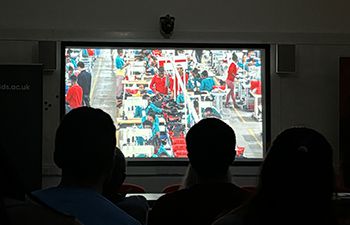Business School film screening offers fresh angles on Chinese investment in Africa
By: Chimezie Anajama
Last updated: Wednesday, 19 February 2025

Audience viewing the documentary
Films can teach students how to sell business ideas, communicate strategies in teams, and understand the social impact of poor business decisions.
Professor Stephan Manning turns to the power of film for communicating complex business ideas, using storytelling to question issues and connect with audiences.
His latest initiative saw the screening of award-winning documentary film ‘Made in Ethiopia’ last week, hosted by the University of Sussex Business School and the Institute of Development Studies (IDS).
The film explores China’s foreign investment in Ethiopia through the experiences of three women during a Chinese-led factory expansion in Dukem. With China’s investment in Africa exceeding $5 billion, this discussion was timely, enabling critical debate on the ethical responsibilities of foreign businesses in developing countries.
A panel discussion followed on ‘New Perspectives on Business and Development in East Africa’, featuring experts: Dr Seife Ayele (IDS research fellow), Dr Jing Gu (Director of the Centre for Rising Powers and Global Development, IDS), and Professor John Humphrey (Honorary Visiting Professor, University of Sussex Business School). This reflected on how foreign investments impact local communities—shaping jobs, livelihoods, land use, and economic prospects.
Dr Seife Ayele remarked, “The documentary created a positive image of Ethiopia through its manufacturing sector. It highlights the country’s industrialisation as rough, disruptive, and intense, with uncertain long-term outcomes.” Its rich storytelling provided insight into the complexities of economic relations between Chinese investors and Ethiopian communities. While some locals lost land and livelihoods due to the factory expansion, others gained economic opportunities through new jobs.
'Made in Ethiopia' also revealed cultural differences between Ethiopian and Chinese workers, particularly in their work ethics. Ethiopians tend to favour a balanced work-life approach, while Chinese workers adhere to an intense, high-pressure work culture. This contrast sparked discussions among the audience, many of whom reflected on similar cultural differences in their own experiences. “In the end, both cultures learned from each other to co-exist,” noted Dr Jing Gu.
Learn more about Professor Stephan Manning’s work on films and storytelling for social change in ‘Boundless’.

